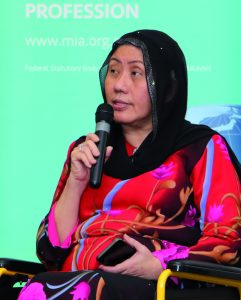By Anis Ramli
In order to enhance governance to support nation-building, MIA recently launched its Thought Leadership Lecture series to help build ethical culture and values among accountants and those charged with governance (TCWG) such as C-suite executives and Boards.
The series will feature renowned business leaders who are specially invited to share their ethical dos-and-don’ts in order to improve tone at the top.
MIA invited YBhg Datuk Zaiton Mohd Hassan, Governance and Audit Committee Chairman of Sime Darby Plantation Berhad to get the ball rolling at its inaugural Thought Leadership Lecture. Datuk Zaiton is one of Malaysia’s most respected business and Board leaders with a wealth of experience in the highly regulated sectors of banking, financial ratings services and financial advisory. She has been appointed by several organisations to help address their reputational and organisational risks as the government focuses on rebuilding good governance throughout the country.
The following are some key takeaways from her session:
1. Develop an Internal Ethical Compass
Datuk Zaiton emphasised that there is no “standard operating procedure” or “SOP for ethics”. Ethics comes from your own conscience and it hinges on the word ‘trust’. “It is something that is embedded in you.” Underpinning this principle is also the fear of God and the consequences of bad behaviour. “This self-awareness is what enables you to build and strengthen that inner compass.”
While some professional bodies like the ACCA have a compulsory ethics module which one needs to pass in order to be admitted as a member, ethics cannot be taught, she said. “The syllabus is more about putting up case studies to make people think ‘what will I do in that situation’?” Therefore, you should self-reflect and ask yourself: what are the morals you grew up with? Then align these values with your priorities and code of conduct.
 2. Document Everything
2. Document Everything
In the fight against unethical behaviour, you have to have a clear view of what matters to you as an individual. “There is no such thing as a grey area in governance,” said Datuk Zaiton. “Once you start seeing grey, then you start to justify everything.”
While there is no strategy or answer for all situations, Datuk Zaiton suggested keeping a record of relevant conversations and meetings – whether formal or otherwise. Recording everything helps you protect yourself and encourages clarity of thought when faced with an ethical dilemma.
3. Professional Competence Through Lifelong Learning
Deepening your knowledge of your industry helps build ethical awareness. Datuk Zaiton cautioned leaders to constantly monitor and strengthen their competence. Always ask yourselves: “Do we know enough to challenge? What is it that we bring to the table?”
To deepen knowledge, it is important to break silos while enhancing lifelong learning. Datuk Zaiton said that accountants especially CFOs and finance function professionals need to play an effective role that goes beyond traditional stewardship and financial management to one that value adds strategically to the organisation.
She urged accountants and leaders to capitalise on professional development courses such as those developed and delivered by MIA. This is critical because lifelong learning enhances the questioning spirit and builds the foundation “for exercising professional judgement and ethical behaviour.”
4. Maintain Professional Scepticism
This leads to the next point, whereby developing competency and professional scepticism is vital for accountants in exercising professional judgement. Always have a questioning mind and be alert to anything that may indicate misstatement, cautioned Datuk Zaiton. “Resist the temptation to accept everything at face value.” By keeping up to date on the latest and best practices, this will enable you to develop and strengthen an enquiring mind.
5. Be Alert and Courageous
As a leader, one is morally bound to disclose wrongdoing, even if formal whistleblowing channels don’t exist. Do take time to listen to what the employees have to say – or to pick up conversations along the corridor, by the water cooler or in the WC – as these can provide clues to misbehaviour. By doing your due diligence to investigate allegations, you can set a good example. By speaking up for the truth, we can build a culture of leading with ethics.






